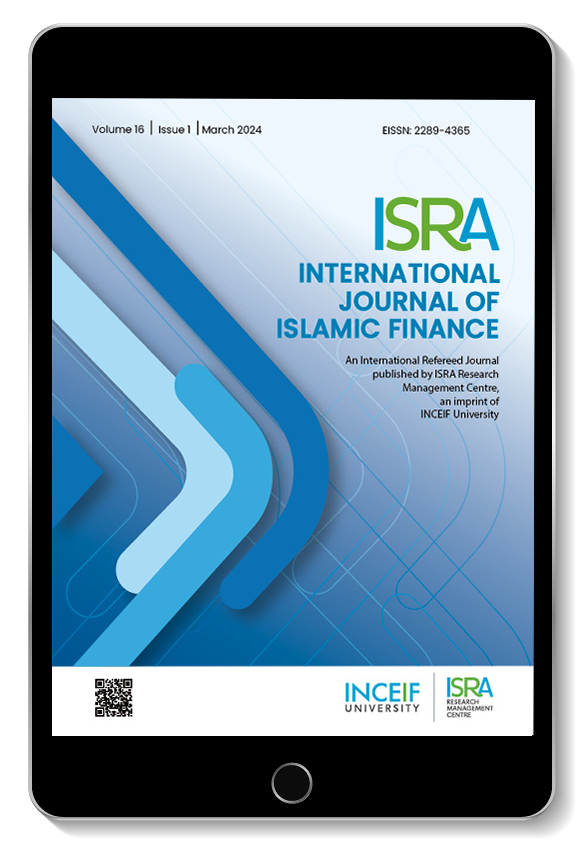2019冠状病毒病对伊斯兰和传统投资者行为的影响:来自2020年印度尼西亚股市崩盘的证据
IF 1.4
Q2 BUSINESS, FINANCE
引用次数: 0
摘要
目的-本文的目的是通过数字时代行为金融的视角,调查COVID-19爆发对印度尼西亚传统和伊斯兰股票市场的影响。 设计/方法/方法-本文的分析重点是与COVID-19相关的变量(如COVID-19病例数和死亡率、与COVID-19相关的搜索查询的谷歌搜索量(GSV)以及与COVID-19相关的恐慌指数)对LQ45传统指数和雅加达伊斯兰指数(JII)的回报的短期和长期影响,使用自回归分布滞后(ARDL)模型。 研究结果-在短期内,死亡率和GSV的增加显著降低了LQ45和JII的回报。相比之下,LQ45和JII的收益不受案例数量或恐慌指数增加的影响。从长期来看,只有恐慌指数影响LQ45的收益。 原创性/价值——这篇文章对文学有三个贡献。首先,它比较了COVID-19疫情对传统和伊斯兰股票市场的影响。第二,探讨新冠肺炎疫情对股票收益的短期动态和长期影响。第三,运用行为金融学的观点解释了新冠肺炎疫情与股市的实证关系。 实际影响-需要基于数字行为科学的政策来防止或减少未来危机期间的金融市场崩溃。本文章由计算机程序翻译,如有差异,请以英文原文为准。
Impact of COVID-19 on the Behaviour of Islamic and Conventional Investors: Evidence from the Indonesia Stock Market Crash 2020
Purpose — The aim of this paper is to investigate the influence of the COVID-19 outbreak on Indonesia’s conventional and Islamic stock markets through the lens of behavioural finance in the digital age.
Design/Methodology/Approach — The analysis in this paper is focused on the short-run and long-run impact of variables associated with COVID-19—such as the number of COVID-19 cases and mortality, the Google Search Volume (GSV) for the search query associated with COVID-19, and the panic index related to COVID-19—on the returns of the LQ45 Conventional Index and Jakarta Islamic Index (JII), using the Autoregressive Distributed Lag (ARDL) model.
Findings — In the short run, increasing mortality and GSV significantly decreases the returns on LQ45 and JII. By contrast, the returns of LQ45 and JII are unaffected by an increase in the number of cases or the panic index. In the long run, only the panic index affects the LQ45 returns.
Originality/Value — This article makes three contributions to the literature. First, it compares the COVID-19 outbreak’s impact on conventional and Islamic stock markets. Second, it discusses the short-run dynamics and long-run impact of the COVID-19 outbreak on stock returns. Third, it provides an explanation of the empirical relationship between the COVID-19 outbreak and the stock market using a behavioural finance viewpoint.
Practical Implications — Digital behavioural science-based policies are needed to prevent or lessen financial market crashes during future crises.
求助全文
通过发布文献求助,成功后即可免费获取论文全文。
去求助
来源期刊

ISRA International Journal of Islamic Finance
BUSINESS, FINANCE-
CiteScore
3.40
自引率
17.40%
发文量
18
审稿时长
20 weeks
期刊介绍:
It is the aspiration of the editorial committee that IJIF achieves the highest rank in quality and substance. It is thus our aim that the journal be carried in the Thompson Reuters’ ISI and Scopus databases. By ensuring high standards in articles published in Islamic finance we ensure that further innovation and research is carried out and promoted in the Islamic finance industry and academia. IJIF publishes 2 issues per annum.
 求助内容:
求助内容: 应助结果提醒方式:
应助结果提醒方式:


